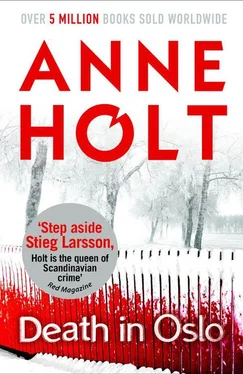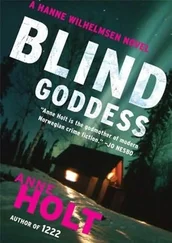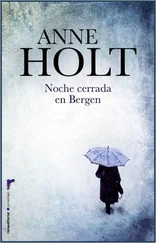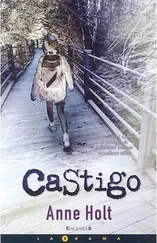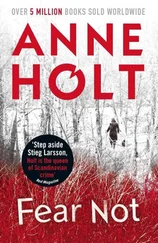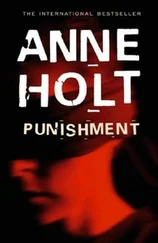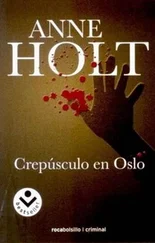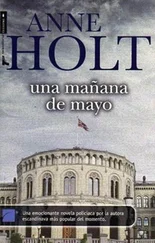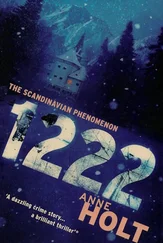Anne Holt - Death In Oslo
Здесь есть возможность читать онлайн «Anne Holt - Death In Oslo» весь текст электронной книги совершенно бесплатно (целиком полную версию без сокращений). В некоторых случаях можно слушать аудио, скачать через торрент в формате fb2 и присутствует краткое содержание. Жанр: Детектив, на английском языке. Описание произведения, (предисловие) а так же отзывы посетителей доступны на портале библиотеки ЛибКат.
- Название:Death In Oslo
- Автор:
- Жанр:
- Год:неизвестен
- ISBN:нет данных
- Рейтинг книги:4 / 5. Голосов: 1
-
Избранное:Добавить в избранное
- Отзывы:
-
Ваша оценка:
Death In Oslo: краткое содержание, описание и аннотация
Предлагаем к чтению аннотацию, описание, краткое содержание или предисловие (зависит от того, что написал сам автор книги «Death In Oslo»). Если вы не нашли необходимую информацию о книге — напишите в комментариях, мы постараемся отыскать её.
Helen Bentley has recently been elected as the first woman president of the United States, beating George W. Bush. Preoccupied with internal stability, Bentley has not made any state visits abroad since her inauguration until the opening of this novel. She’s decided to visit Norway, the safest country in the world from the point of view of its dearth of terrorist attacks and its internal stability. Mysteriously, Bentley travels very light, refusing to let her husband and teenage daughter accompany her, and allowing only the minimum in terms of her own security. Abruptly, she vanishes from her hotel room on the first night of her visit, during the preparations for Norway’s national midsummer day holiday celebrations.
The rest of the book deals with the aftermath of this shocking event. The author is mainly interested in looking at the United States in relation to the rest of the world, in particular the country’s response to the 9/11 atrocities in terms of its sudden legislation to remove many civil liberties as the authorities seek to track and monitor any possible attack from within. After Helen Bentley disappears, the Norwegian police and security services begin an immediate and exhaustive investigation, soon discovering witnesses who saw the president travelling in a car (oddly, in a very wide-ranging trip around the country) and pulling the perpetrators in for questioning. Although progress in this sense is very fast, these leads go nowhere and the authorities are left in total ignorance of the president’s whereabouts, as well as how and why she was kidnapped.
At the same time, the Americans themselves are piling into Norway, quickly brushing aside offers to share the investigation and setting up their own system from their embassy. Warren Scifford, who we know from previous novels by reputation as a senior “spook” of some kind in the USA, is called in as he’s become the president’s special adviser and is also her friend – one of the small circle who helped her to get elected. As soon as he arrives, Warren asks for Johanne Vik, his ex-student, to be his liaison between the US and Norwegian investigations. Not only does Johanne refuse this request because of their past history, but when Warren instead asks Adam Stubo, Johanne’s husband and a senior policeman, to take the role (no doubt hoping Adam will discuss the case with Johanne and pass on her insights), Johanne tells Adam she and their baby daughter will leave him if he accepts. Adam has no choice but to accept his boss's instruction to accompany Warren. As soon as he does, Johanne takes her baby and goes to the only person she knows will take her in and not ask questions. Her decision brings her right into the centre of events in the most incredible (unlikely) sense, and her skill as a profiler becomes crucial in the hunt for the missing woman.
DEATH IN OSLO is a book that I find hard to assess. On the one hand it is extremely good and had me reading keenly to the end. It is very strong on its analysis of the international political scene and of the motives and modus operandi of the perpetrators. I don’t usually like these “who kidnapped the president?” thrillers but this one is certainly superior, partly because of the author’s confidence in constructing the scenario in all its disparate scenes that slowly come together, and partly because of the attractive character of Helen Bentley and the flashbacks to her campaign and political manoeuvrings. In other ways, however, the plot is unbelievably weak. Without giving away spoilers, the whole book depends on two massive coincidences- where the president goes after her disappearance; and Adam’s closeness to the investigation. As well as this, too many puzzles that the author creates are simply left, not even unanswered, but just ignored. The character of Warren is an enigma – we know he has done something unspeakable to Johanne in the past, but not what. Now he is apparently a close friend of the president – is he in fact a double agent? Is he operating with or against the FBI? Why does he want to work with Adam and then ignore him, regularly disappearing? And, more generally, why is the apparently very persuasive briefing document about the most likely source of threats to the president ignored by the authorities, even though it is on file? And why is the person behind the killing, who obsessively plans for many years and has endless failsafes in place for various aspects of the plans, so casual about how the crucial final piece of information is to be disseminated? (Though this part of the plot does include a lovely character sketch of a widower and his daughters.) And why did the president travel with minimum security against advice?
These and many other issues are left hanging – in addition, the spectre of Wenke Benke (see THE FINAL MURDER) hovers over the novel – yet is not developed. The actions of the president are very hard (impossible, in my case) to comprehend, both before and after her disappearance – too much is simply left unexplained. And although we receive a throwaway piece of vital information about why Johanne hates Warren so much, most of the details are not shared with the readers.
In many respects, DEATH IN OSLO is an tight, convincing and readable thriller with good characterisations (particularly Adam and Johanne), yet in others, it seems incredibly careless – which is incomprehensible to me as I (not the most imaginative of people) can think of several ways in which some of the more implausible elements of the plot could have been made more authentic, and in particular, it isn’t hard to think of how the last part of the puzzle could be made more robust on the part of the bad guys given all their previous careful planning. All in all, I’m left confused as to why some parts of this well-translated book are so good, whereas others have a casually unfinished air to them, leaving the reader feeling a bit cheated, even though the read itself is so exciting.
Death in Oslo has just been reviewed by Karen Meek at Euro Crime.
